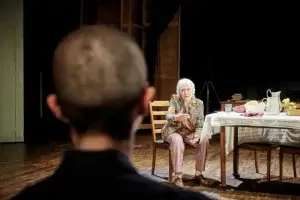
The Guardian
5 stars out of 5
The Confessions review – dazzling drama drawn from a mother’s memories
National Theatre, London
Alexander Zeldin’s profoundly moving play grew from his parent’s reflections, which he uses to conjure an epic struggle for love and freedom
A reluctant protagonist stands at this drama’s centre: Alice, diminutive and white-haired, enters before the curtain is raised to insist: “I’m not interesting.”
She becomes bifurcated into young Alice (Eryn Jean Norvill) and old (Amelda Brown). But for all the diffidence on her part, writer and director Alexander Zeldin knows exactly what he is doing and why he is doing it. He spent time recording his mother and her peers to create this tight, searing sweep across a generation of women who fought to make themselves seen and heard. The result is a drama that captures heart and mind, brimming with emotional delicacy and quietly dazzling in its ambition. On paper, Alice’s life might perhaps be deemed uninteresting, beginning in Australia in 1943 and involving a move to Britain, one bad marriage and another good one. We see her shelved ambitions to become a writer and her struggle towards a self-fashioned freedom within the bounds of her time. There are snapshots rather than the full chronology: the nervy first meeting between boyfriend Graham (Joe Bannister) and her parents; a car crash dinner party some years into her marriage with him; the evening she meets a poet and realises she could be living a different life. These life-changing moments unfold in kitchens that are conspicuously constructed on stage. Zeldin is Paris-based and this play feels distinctly European in its sensibility and style, not only in its deftly psychoanalytic exploration of the mother and child bond but also its Brechtian elements. There is a constant dismantling of the set and blurring of art/life boundaries but remarkably, even with these distancing techniques, we are drawn closer to Alice. Yannis Philippakis’s musical accompaniment brings its own booming, bass, depths and it enters our body just as drama seems to do.
We see all the ways in which Alice is diminished as a woman. There is violation in marriage long before a sexual assault which takes place behind closed doors. Zeldin manages to capture awkwardness too with such funny, gawky compassion that it becomes its own masterclass. The cast members double up in roles with quick changes and are accomplished in their parts.
As we travel from postwar Australia into 1960s university campus bohemia, the drama resembles a comic version of Marilyn French’s The Women’s Room. Ball-breaking feminist Eva (Pamela Rabe) is clearly fashioned on Germaine Greer and is given some excellent lines (“I’m taking my beer in for a shit,” she says as she leaves the stage). These scenes are satirical but always retain a beating heart.
The portrait of motherhood comes with brute, honest economy. Brief scenes capture oceans of pain: Alice, in her 20s, rebelling against the mother who told her to settle for Graham because “the world is full of sharp surfaces”. Alice in her 40s, about to become a mother, using exactly that line.“Stop asking me about this,” Alice says to her onstage son as he tries to draw out the raw and painful material he needs for this play. But there is no sense of appropriation here. Zeldin keeps himself barely there. This is a search for the whole Alice before she was squeezed into the role of mother . Ultimately, it is hard to pin this profoundly moving play down to its depths. It is a piece of alchemy and an expression of love.